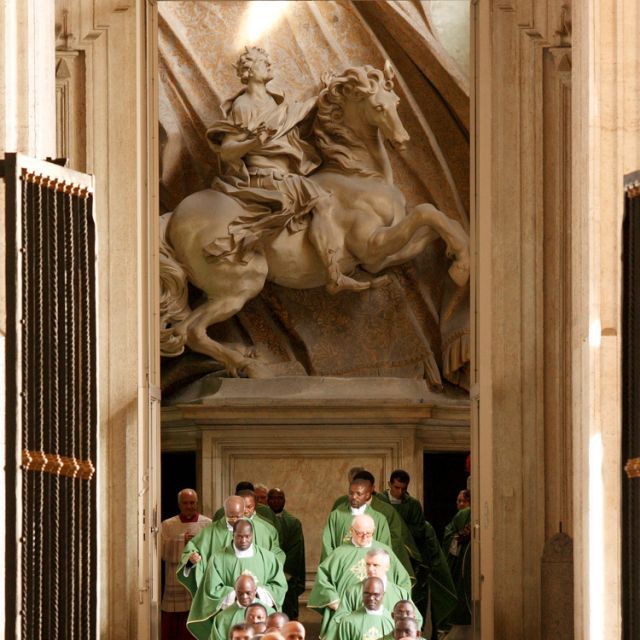However, Norbertine Father Bernard Ardura, committee president, also admitted that "many centuries would be needed" before there was a widespread recognition of full religious freedom for everyone in a pluralistic society and before a respectful church-state separation was achieved.
In fact, said Cardinal Agostino Vallini, papal vicar for Rome, it wasn't until the Second Vatican Council that the Catholic Church fully, formally recognized everyone's right to religious freedom.
The council's document on religious freedom said: "The human person has a right to religious freedom. This freedom means that all men are to be immune from coercion on the part of individuals or of social groups and of any human power, in such wise that no one is to be forced to act in a manner contrary to his own beliefs, whether privately or publicly, whether alone or in association with others, within due limits."
Even as the international group of historians gathered at the Vatican to discuss the latest scholarship about Constantine's conversion, it was his connection to the modern idea of religious liberty that was seen as most relevant both for the world at large as well as for the Catholic Church.
For example, the U.S. bishops have said the Obama administration is threatening religious freedom by attempting to force Catholic institutions to include contraception -- which the church teaches is immoral -- in health care plans. And the Second Vatican Council's recognition of religious freedom is one of the sticking points in the ongoing discussions between the Vatican and the traditionalist Society of St. Pius X.
In fact, the U.S. district of the society explained its position April 13 in an article that described as "problematic" a recent statement by the U.S. bishops' Ad Hoc Committee for Religious Liberty. The SSPX statement said, "As for man's 'liberty,' mankind has been endowed with free will, but only to use for good -- that which corresponds with truth (i.e., Christ and his church) -- but not to do evil.... Error never has any rights. However, the secularistic and anti-Catholic principle of religious liberty denies this reality and instead, makes error equal to truth."
While the council affirmed traditional church teaching that people have an obligation to seek the truth, and that the fullness of truth is found in the Catholic Church, it insisted that no one could be forced to accept truth.
Opinions about Constantine's legacy -- and even his conversion -- differ, even among Catholic scholars. Contrasting points of view on the sincerity of Constantine's faith and his impact on the faith of others in the Roman Empire came to the fore quickly during the Vatican conference April 18-20.
While preserving academic decorum at a small Vatican news conference announcing the Constantine confab, two historians agreed that the 4th-century emperor played an important role in the development of the idea of church-state separation, but they did not agree on how he actually did that.
Claire Sotinel, a professor of Roman history at the University of Paris-Est Creteil and one of the organizers of the conference, said, "Constantine's conversion marked a new way of thinking about religion and power. It was a complete break. When Constantine became Christian, it was the first time the ruler (of the Roman Empire) was not also the religious leader."
But Giovanni Maria Vian, a historian better known as the editor of L'Osservatore Romano, the Vatican newspaper, said that while Constantine identified himself as a Christian after the battle on the bridge in 312, "he never gave up the (then pagan Roman) title 'Pontifex Maximus,' he continued to preside over pagan rituals and was baptized only on his deathbed."
Still, Vian said, by identifying himself as a Christian and solidifying the rights of Christians to practice their faith, "Constantine made Christianity available to the poor -- the masses -- and not just the elite. He made it possible for the church to be what it is today."
Vian also said the so-called "Constantinian revolution" wasn't all it is popularly cracked up to be. The systematic persecution of Christians in the West ended before his reign and Christianity was not proclaimed the official religion of the empire until some 47 years after his death, he said.
Both he and Sotinel dismissed the claims of some historians that far from promoting religious freedom, Constantine's embrace of Christianity, or at least the favors he granted the church, actually gave birth to centuries of Christian teaching and violence against the Jews.
Sotinel said there is no historical evidence, including in Jewish sources, of anti-Jewish activity on the part of Christians in the empire before the fifth century.
The topic of Constantine and religious liberty will be given even greater attention by historians and church leaders in 2013 when they mark the 1,700th anniversary of the Edict of Milan -- a proclamation of tolerance of Christianity throughout the Roman Empire signed by Constantine and the Emperor Licinius, who ruled the eastern part of the empire.


